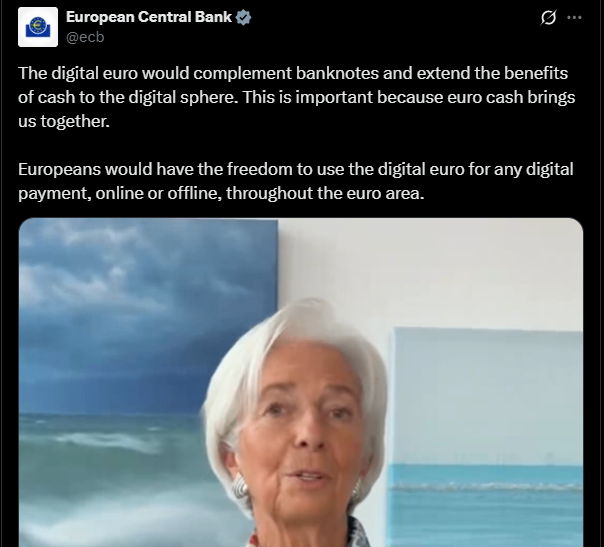TL;DR
- ECB President Christine Lagarde described the digital euro as a "symbol of trust in our common destiny."
- The ECB plans to roll out the retail CBDC by 2029 if legislation passes.
- The debate highlights Europe's growing divide between digital innovation and personal autonomy.
European Central Bank (ECB) president Christine Lagarde has renewed her call for a digital euro, positioning it as a tool to strengthen unity and trust within the European Union.
In a statement released on Friday, Lagarde said:

She argued that the introduction of a central bank digital currency (CBDC) would ensure that citizens can continue to use state-backed money even as Europe transitions deeper into the digital era.
Lagarde's comments came just a day after the ECB governing council confirmed plans to move forward with building the technical infrastructure for the digital euro, targeting 2029 for its first potential rollout-provided the European Parliament approves the necessary legislation. The digital euro project, which has been under discussion since 2020, is now entering its implementation phase following years of research and preparation.
According to the ECB, the digital euro would serve as electronic cash, allowing consumers to make online and offline payments using a euro-denominated digital wallet backed directly by the central bank. Proponents argue that this system would enhance the resilience of Europe's payment landscape, reduce dependency on foreign payment processors, and ensure universal access to a trusted form of money even in times of crisis.
But not everyone is convinced. The European public remains sharply divided, with privacy concerns dominating the discussion. A number of European lawmakers and economists have warned that CBDCs could easily become a mechanism for mass financial surveillance, undermining the same trust Lagarde claims the digital euro would protect.
Crypto Community Responds with Outrage
Lagarde's remarks drew widespread backlash from the crypto community and political commentators who saw the statement as tone-deaf to legitimate concerns about financial autonomy and privacy.
Political philosopher David Thunder wrote on X (formerly Twitter):
Thunder added that there are "surely safer ways to digitise currency" without enabling "intrusive forms of economic surveillance," arguing that the European Union appears "to have no interest in exploring them." Source
The response was echoed by countless crypto influencers and privacy advocates who see the digital euro as a government-controlled alternative to decentralized digital assets like Bitcoin. While cryptocurrencies such as Bitcoin and Ethereum operate on open, permissionless networks that anyone can use without identity verification, a CBDC would require full compliance with KYC (Know-Your-Customer) and AML (Anti-Money Laundering) regulations, effectively removing anonymity from digital payments.
Europe at a Crossroads
Lagarde's framing of the digital euro as a "symbol of trust" reveals a deeper philosophical divide over what "trust" actually means in a digital economy.
For the ECB, trust lies in institutional reliability-a system where the state guarantees the value of money. For many citizens and crypto advocates, trust lies in transparency and autonomy, not institutional oversight. That divide may determine whether Europe embraces or rejects the digital euro when it finally reaches the decision stage.
Until then, the debate continues-pitting privacy against progress, control against convenience, and trust in people against trust in institutions.
ALSO READ: COTI V2 Use Cases: Setting a New Benchmark for Blockchain Privacy









